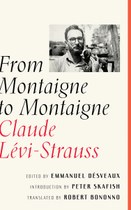Beskrivelse
In January 1937, between the two ethnographic trips he would describe in Tristes Tropiques, Claude Lévi-Strauss gave a talk to the Confédération générale du travail in Paris. Only recently discovered in the archives of the Bibliothèque national de France, this lecture, “Ethnography: The Revolutionary Science,” discussed the French essayist Michel de Montaigne, to whom Lévi-Strauss would return in remarks delivered more than a half-century later, in the spring of 1992. Bracketing the career of one of the most celebrated anthropologists of the twentieth century, these two talks reveal how Lévi-Strauss’s ethnography begins and ends with Montaigne—and how his reading of his intellectual forebear and his understanding of anthropology evolve along the way.
Published here for the first time, these lectures offer new insight into the development of ethnography and the thinking of one of its most important practitioners. Essays by Emmanuel Désveaux, who edited the original French volume De Montaigne à Montaigne, and Peter Skafish expand the context of Lévi-Strauss’s talks with contemporary perspectives and commentary.
Claude Lévi-Strauss (1908–2009) was a French anthropologist and ethnologist who was foundational in the development of structuralism and structural anthropology. The best known of his many books are Tristes Tropiques, The Savage Mind, and Myth and Meaning.
Emmanuel Désveaux is a director of studies at the École des hautes études en sciences sociales.
Peter Skafish is visiting assistant professor of anthropology at University of California, Berkeley. He is editor and translator of Cannibal Metaphysics by Eduardo Viveiros de Castro (Univocal/Minnesota, 2014).
Robert Bononno has translated fiction and nonfiction, including René Crevel’s My Body and I (a finalist for the French-American Foundation Prize) and works by Michel Foucault, Henri Lefebvre, Albert Memmi, and Isabelle Stengers published by the University of Minnesota Press.
«To learn from such a guileless mind, perhaps we have to reverse background and figure in the already inverted approach to reading applied to philosophers by looking for the answers rather than the questions—for statements so transparent that they become enigmas upon scrutiny—and then find or imagine their missing interrogative mates.» — Peter Skafish, from the Introduction



